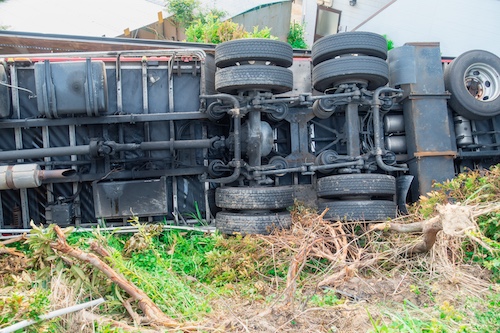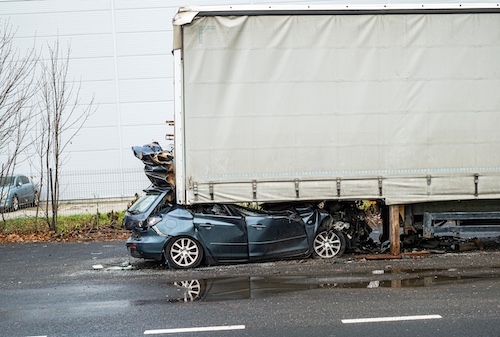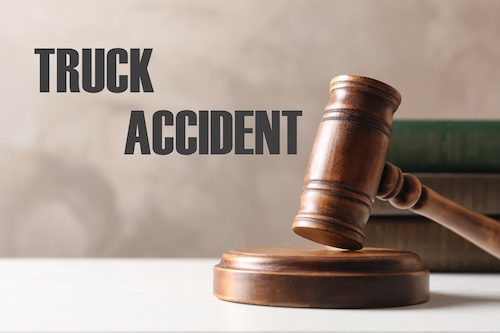Sue Trucking Company After a Georgia Accident
A collision with a commercial truck can cause life-changing injuries and serious financial losses. When the trucking company’s negligence is responsible, you have the right to take legal action and seek compensation. Understanding how to sue a trucking company in Georgia begins with knowing the laws that apply, the evidence needed to prove fault, and the damages you can recover.
In this blog, you will learn how trucking company negligence is proven in Georgia accident cases, what evidence is needed, the damages you can recover, and why working with an experienced Atlanta truck accident lawyer is critical to building a strong claim.
Georgia Legal Framework for Trucking Company Liability
Understanding Georgia’s legal rules for holding a trucking company liable helps you know what is required before you sue a trucking company. These laws define how fault is proven and which parties can be held responsible.
Negligence Standard in Georgia
In Georgia, negligence means failing to use the care that a reasonable person would under similar circumstances. The law defines negligence in O.C.G.A. § 51-1-2. To hold a trucking company responsible, you must show duty, breach, causation, and damages. This applies to both the truck driver and the company that employs them.
Employer Liability and Vicarious Liability
A trucking company can be held responsible for the actions of its driver through vicarious liability. This applies when the accident occurred while the driver was performing job-related duties. Under state law, an employer is liable for the negligence of its employees committed within the scope of employment.
Role of Federal and State Regulations
Trucking companies must follow the Federal Motor Carrier Safety Regulations. These rules cover driver qualifications, hours of service, vehicle maintenance, and cargo securement. Violations of these regulations can be strong evidence of negligence. Georgia also enforces its own commercial truck safety laws that work alongside federal standards.
Proving Negligence in a Truck Accident Claim
When you sue a trucking company, you must connect the company’s actions or inactions to the accident. This can include negligent hiring, poor training, unsafe schedules, or failing to maintain vehicles. A truck accident attorney uses records, witness testimony, and accident reconstruction to prove these violations.
Common Forms of Trucking Company Negligence
Trucking company negligence can appear in many ways. Each form can cause serious injuries and lead to a truck accident claim.
Negligent Hiring and Retention
A trucking company may hire a driver with a poor driving record, prior safety violations, or a history of substance abuse. Failure to perform background checks or ignoring red flags increases the risk of a crash. Keeping such drivers on staff after repeated problems is negligent retention.
Inadequate Training and Supervision
Commercial truck drivers must understand federal regulations, defensive driving, and safe cargo handling. If a trucking company does not provide proper training or fails to monitor a driver’s performance, it can be held legally responsible for resulting accidents.
Poor Vehicle Maintenance
Commercial trucks require regular inspections and repairs to remain safe. Skipping maintenance, using unsafe equipment, or ignoring mechanical issues can cause a truck crash. Maintenance logs are often used to prove this form of negligence.
Unsafe Delivery Schedules
Some trucking companies pressure drivers to meet unrealistic delivery times. This can cause hours-of-service violations, driver fatigue, and speeding. These practices can be evidence when you sue a trucking company for negligence.
Improper Loading or Cargo Securement
Overloading a trailer or failing to secure cargo correctly can cause loss of control, rollovers, or falling debris. Federal and Georgia safety rules set standards for proper loading. Violating these rules is a common factor in truck accident lawsuits.
Evidence That Proves Trucking Company Negligence
Proving a trucking company’s negligence requires strong, clear evidence that connects their actions to the accident. A truck accident attorney uses multiple sources to build a case.
Accident Scene Evidence
Photos, videos, and measurements from the accident scene can show how the crash occurred. Skid marks, vehicle positions, and debris patterns often help determine liability. Black box data from the truck records speed, braking, and engine activity before the crash.
Company Records
Internal company documents can reveal unsafe practices. Driver qualification files, maintenance logs, and dispatch records may show violations of safety rules. These records can help prove negligent hiring, poor supervision, or lack of vehicle maintenance.
Driving Logs and Hours-of-Service Records
Electronic or paper logbooks track a driver’s work hours. Violations of federal hours-of-service limits may indicate fatigue contributed to the crash. False or incomplete logs can be evidence of wrongdoing by the trucking company.
Medical Records
Medical records connect the injuries to the truck accident. They document the seriousness of injuries, treatment plans, and long-term medical needs. These records help support claims for medical expenses and lost income.
Witness Testimony and Expert Analysis
Eyewitnesses can describe the truck driver’s behavior before and during the crash. Accident reconstruction experts use physical evidence to explain how the collision happened. Expert testimony often strengthens a truck accident lawsuit.
Determining All Liable Parties
A truck accident can involve more than one liable party. Identifying every responsible party is important when you sue a trucking company and seek full compensation.
Trucking Company
The trucking company can be held responsible for the negligence of its drivers under Georgia’s vicarious liability laws. It may also be directly liable for unsafe hiring practices, poor supervision, or failure to maintain its commercial trucks.
Truck Driver
The truck driver may be personally liable if their negligence caused the accident. This can include speeding, distracted driving, or violating federal regulations. The driver’s actions often form the basis of a truck accident lawsuit.
Maintenance Contractors
Some trucking companies use outside contractors for inspections and repairs. If a maintenance provider failed to keep the vehicle safe, they can be a liable party in a truck accident claim.
Cargo Loaders
Improperly loaded or secured cargo can cause a truck crash. Cargo loading companies that fail to follow safety rules may be held legally responsible.
Truck Manufacturer
If a defective truck part contributed to the accident, the manufacturer or parts supplier may be liable. Product defects can involve brakes, tires, steering systems, or other critical components.
Government Entity
When a dangerous road condition plays a role in a crash, the local or state government entity responsible for road maintenance may share liability. Claims against government entities follow special procedures in Georgia.
Damages You Can Recover When You Sue a Trucking Company
When you sue a trucking company in Georgia, you may recover compensation for the losses you suffered in the accident. Damages can cover both financial and non-financial harm.
Economic Damages
Economic damages include the measurable financial losses caused by the truck accident. These can include medical bills, rehabilitation costs, lost income, and future loss of earning capacity. They may also cover property damage and other out-of-pocket expenses related to the crash.
Non-Economic Damages
Non-economic damages compensate for losses that do not have a direct financial value. These include pain and suffering, emotional distress, and loss of enjoyment of life. The amount is based on the seriousness of the injuries and the impact on daily living.
Punitive Damages
In Georgia, punitive damages may be awarded in cases of willful misconduct or gross negligence under O.C.G.A. § 51-12-5.1. These damages punish the defendant and discourage similar behavior in the trucking industry.
Documenting Damages
To seek full compensation, it is important to gather evidence of every loss. Medical records, employment records, and expert testimony help show the extent of damages. A truck accident attorney uses this documentation to present a strong claim to the insurance company or in court.
Speak With an Atlanta Truck Accident Lawyer Today!
If you or a loved one were injured in a truck crash, taking action quickly can make a difference in the outcome of your case. Evidence can fade, witnesses can become harder to locate, and the trucking company’s insurance team may already be working to protect their interests. Our team at GMV Law Group is prepared to step in immediately, investigate the accident, secure critical evidence, and hold the trucking company accountable for its negligence.
Contact us at 404-975-4878 for a free case consultation today!







